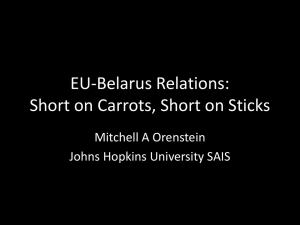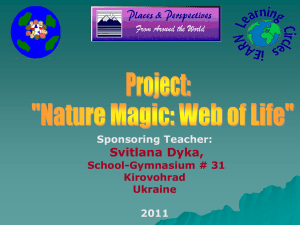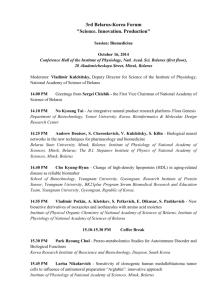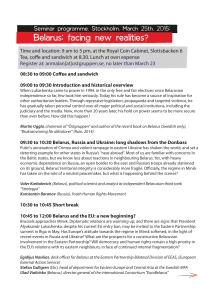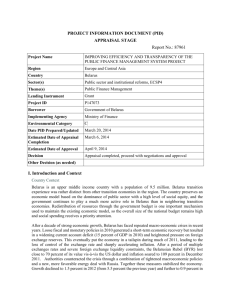Participating NGOs in Belarus activities
advertisement
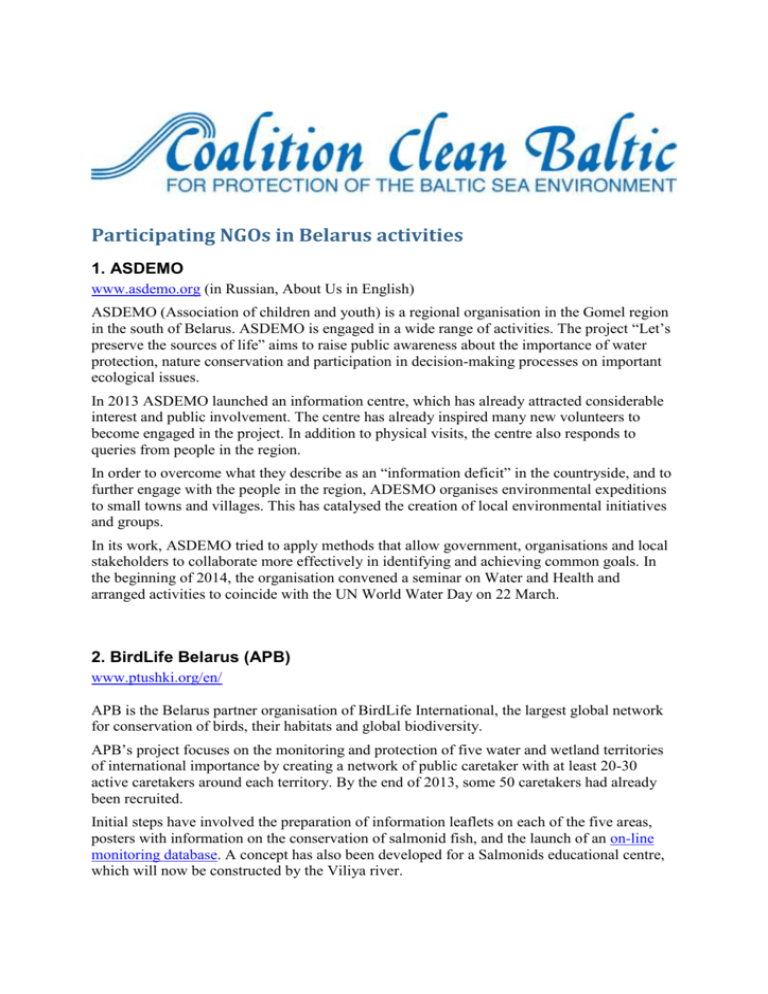
Participating NGOs in Belarus activities 1. ASDEMO www.asdemo.org (in Russian, About Us in English) ASDEMO (Association of children and youth) is a regional organisation in the Gomel region in the south of Belarus. ASDEMO is engaged in a wide range of activities. The project “Let’s preserve the sources of life” aims to raise public awareness about the importance of water protection, nature conservation and participation in decision-making processes on important ecological issues. In 2013 ASDEMO launched an information centre, which has already attracted considerable interest and public involvement. The centre has already inspired many new volunteers to become engaged in the project. In addition to physical visits, the centre also responds to queries from people in the region. In order to overcome what they describe as an “information deficit” in the countryside, and to further engage with the people in the region, ADESMO organises environmental expeditions to small towns and villages. This has catalysed the creation of local environmental initiatives and groups. In its work, ASDEMO tried to apply methods that allow government, organisations and local stakeholders to collaborate more effectively in identifying and achieving common goals. In the beginning of 2014, the organisation convened a seminar on Water and Health and arranged activities to coincide with the UN World Water Day on 22 March. 2. BirdLife Belarus (APB) www.ptushki.org/en/ APB is the Belarus partner organisation of BirdLife International, the largest global network for conservation of birds, their habitats and global biodiversity. APB’s project focuses on the monitoring and protection of five water and wetland territories of international importance by creating a network of public caretaker with at least 20-30 active caretakers around each territory. By the end of 2013, some 50 caretakers had already been recruited. Initial steps have involved the preparation of information leaflets on each of the five areas, posters with information on the conservation of salmonid fish, and the launch of an on-line monitoring database. A concept has also been developed for a Salmonids educational centre, which will now be constructed by the Viliya river. The caretakers’ groups have been provided with equipment and training, and guidelines have been developed for their work. Caretakers have been active patrolling rivers, collecting data on fish populations and breeding sites, recording sources of pollution and transmitting information on violations to the local authorities. 3. Centre for Environmental Solutions (CES) www.ecoidea.by (in Russian) Centre for Environmental Solutions works to promote eco-friendly lifestyles, the principles of sustainable development and international cooperation in order to preserve the environment. It is based in Minsk, and hosts the secretariat of the CCB project in Belarus. In 2013 CES conducted a nation-wide survey of public perceptions of water quality and water pollution, and people’s attitudes towards engaging in to defend their environment. One third of the 1100 respondents were dissatisfied with the quality of drinking water in their place of residence, and one in six were prepared to take action in order to assert their environmental rights. In the field of agriculture CES has developed two manuals on organic farming, which are now used in the training of agronomists and in courses for public managers. It has also developed recommendations for a state pilot farm to make the transition form conventional to organic agriculture. In November 2013, CES was one of the organisers, together with the ministries for agriculture and the environment, of an international conference on organic agriculture. In collaboration with the Ministry of Natural Resources and Environmental protection, CES also organised an international conference on environmental monitoring. Among the issues that were addressed was the development of a national monitoring system, as well as the interaction between such a system and the public environmental monitoring that is organised by CCB project partners and other non-governmental organisations. Among its many other activities, CES has initiated two regional information centres, prepared an online database of pollution hot-spots and produced a wide range of information materials, arranged environmental expeditions and camps for school children, and run educational seminars for teachers. 4. Ecohome www.ecohome-ngo.by (in Russian) www.agracultura.org (in Russian and English) Through its massive use of fertilisers and pesticides, intensive and industrial farming is a major source of water pollution in Belarus. Ecohome promotes organic agriculture as a tool for the protection of water resources. The new organic agriculture centre Agro-Eco-Culture, which was established in 2013, contributes actively to the implementation of the project. The project addresses a number of different constituencies. Farmers and “micro-farmers” – such as the owners of summer homes (datchas) – are provided with information, training and guidance on organic agriculture methods. In collaboration with http://www.pkegliwice.pl/ (a Polish CCB member organisation) Ecohome also supports farmers to certify their organic production. Three farms have already become certified under the EU organic agriculture standard, and twelve more have benefited from consultations. The project also provides training and produces training materials for a wide range of university students, public administration managers, lawyers and agriculture advisors. Furthermore, Ecohome educates the public on the benefits of organic agriculture – through initiatives such as the Agri-Cultural Fest festival, meetings between consumers and farmers, or the booklet How to eat sustainably – and thereby helps boost consumer demand for organic produce. At the policy level Ecohome has contributed towards the development of the draft Law on Organic Agriculture. -------------------------------------------------- 5. Brest Environmental Awareness Center (Ecohome Brest) www.bresteco.by Ecohome Brest is a branch of the CCB member organisation Ecohome. The region of Brest is located in the south-western corner of Belarus, on the borders of Poland and Ukraine. Ecohome Brest’s contribution to the CCB project focuses on the quality of drinking water. In many rural areas in Belarus, people get their drinking water from wells that are polluted by agricultural chemicals (pesticides, herbicides and fertilizers). Nitrates are considered to be the pollutants that pose the biggest threats to human health. During 2013, Ecohome Brest initiated a pilot project to test the nitrate contamination in wells. As part of the project, Ecohome Brest has opened a Water Information Centre that provides opportunities for citizens to register complains and make requests, to learn how they can influence the water management, and to participating in relevant decision-making processes. The group also uses a combination of action days, film screenings and outreach via media in order to to draw public attention to issues related to water quality and water management. Good working relations have been established with the university, health and natural resource authorities, and libraries. Plans to organise roundtable discussions on water related issues have, however, not yet been realised due to the reluctance of key actors to take part. 6. Ecoproject Partnership www.ecoproject.org (English and Russian) OBS INGET HÄR OM CCB ELLER PROJEKTET!, www.ecoproject.by Water and Health is the theme for a protocol signed by parties to UN-ECE Water Convention (the Helsinki Convention of 1992). The purpose of the protocol is to protect human health by improving water management. Ecoproject Partnership (Ecoproject), an organisation based in Minsk, takes this protocol as a starting point for its Water and Health Campaign. The campaign aims to raise the level of public participation and access to information on this theme. In 2013, Ecoproject launched an information centre on water hand health. Responses to the most frequent questions that are asked are posted on the project’s web site. Already during its first year, it registered over 900 visitors. Information was also disseminated through five Ecoproject publications and more than 30 reports in the media. Some of these materials are now being introduced into the training programs on water and sanitation at the Belarus Technical University. The campaign has also organised meetings, polls and testing of drinking water quality in more than one thousand wells in rural areas. The research shows that almost half of the tested wells have high levels of nitrates, and 555 pollution “hot spots” have been identified. On the basis of these findings, discussions have been initiated with the local authorities. Ecoproject participates in a NGO Working Group on water problems and legislation related to water. Among its activities, the working group has provided joint input into the discussions at the meeting in 2013 of the parties to the Water and Health protocol. 7. ENDO ENDO is an environmental organisation working in the Mogilev region in Eastern Belarus. The main aim of their project activities is to reduce the eutrophication of waters in the district of Mogilev. ENDO has produced information materials on the problem with nitrate contamination of water wells, and addresses this issue in training programs directed towards rural residents, health care workers, parents and other target groups. Test strips for analysing the levels of nitrates in water have been purchased and distributed, along with instruction for the volunteers on how to interpret the results and discuss the issue with people who are affected by polluted wells. ENDO also provides training for students and teachers on how to reduce water pollution. Test kits for low-cost water analysis have been developed, and teachers have been trained on how to use them. A Water Information Centre has been launched in collaboration with the Mogilev State University. The University provides space for the Centre’s information activities free of charge, and the Centre also gets access to laboratories for analysing water samples. Further collaboration between organisations (including project partner ASDEMOlink), activists and researchers is coordinated through the Dnieper River Network, which organises field expeditions and studies, testing, trainings and dialogue. 8. Neman Environment Group The Neman Environment Group is active in the Grodno region in Western Belarus. Neman’s project for restoring wild salmon habitats is part of CCB’s initiative for protecting the Baltic salmon, and has been implemented in Belarus since 2006. Activities focus on the Viliya, a tributary to the Neman river through which it flows into the Baltic Sea. The group has carried out detailed ecological and morphological surveys and assessments of seven tributaries to the Viliya. Monitoring of the rivers is organised in collaboration with specialists from Belarus and Lithuania. Survey and monitoring data have been presented in a booklet, as well as on a dedicated web site that has attracted considerable interest. During the spawning season, the Neman Environmental Group organises river patrols by volunteers in order to protect the fish in four rivers from poachers. The group is also engaged in activities with the aim to directly restore and upgrade salmon habitats. One example is on the Tartak tributary to the Viliya, where structures have been installed that help the migrating fish get past a road dam on the river. The pass-way was an immediate success, as for the first time in more than 20 years sea trout spawned in the upper reaches of the river. 9. Nerush www.nerush.org The Nerush environmental group is based in the city of Baranovichi in the western Brest region of Belarus. Their contribution to the CCB project focuses on involving the public in water protection activities. One key objective is to improve the management of the waters in the Stronga nature conservation area. In early 2014 Nerush organised a seminar that initiated the process of developing a new management plan for Stronga. Students in schools and universities have formed River Groups that are engaged in monitoring rivers and water sources. Within a few months they have tested 120 water sources in four regions for nitrates, using two compact chemical laboratories. The River Groups also take part in activities that Nerush organises for monitoring the isolated trout populations in the region. 8 monitoring points have been established, and the same number of appeals has been made to draw the attention of the authorities to problems that have been identified. Nerush promotes agro-ecotourism as a means to stimulate sustainable development in the region. In collaboration wit the University of Baranovichi, Neruch organised a scientific conference on the subject, and as a result of its work the group has been invited by local authorities to participate in a council and working group for the development of new agroecotourism projects in the region.
